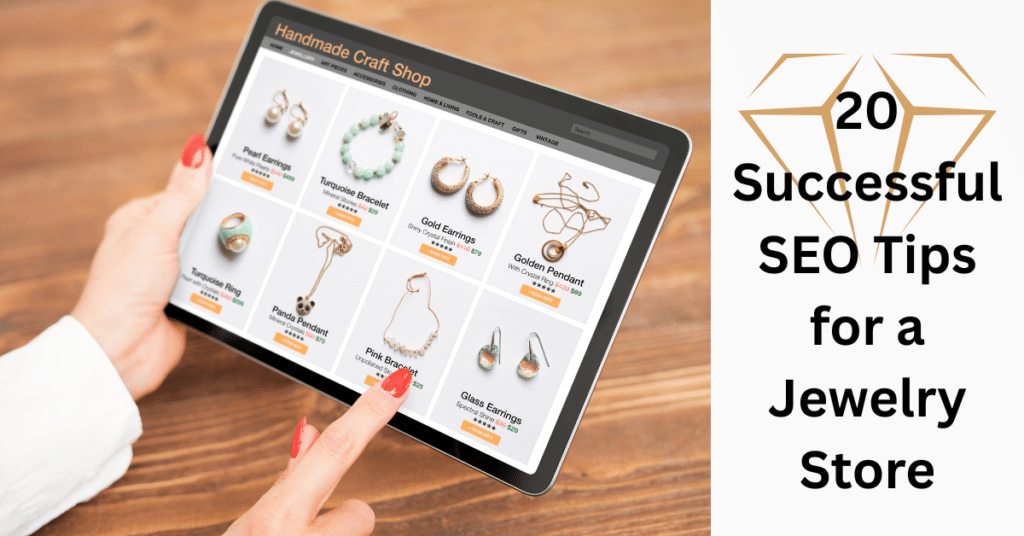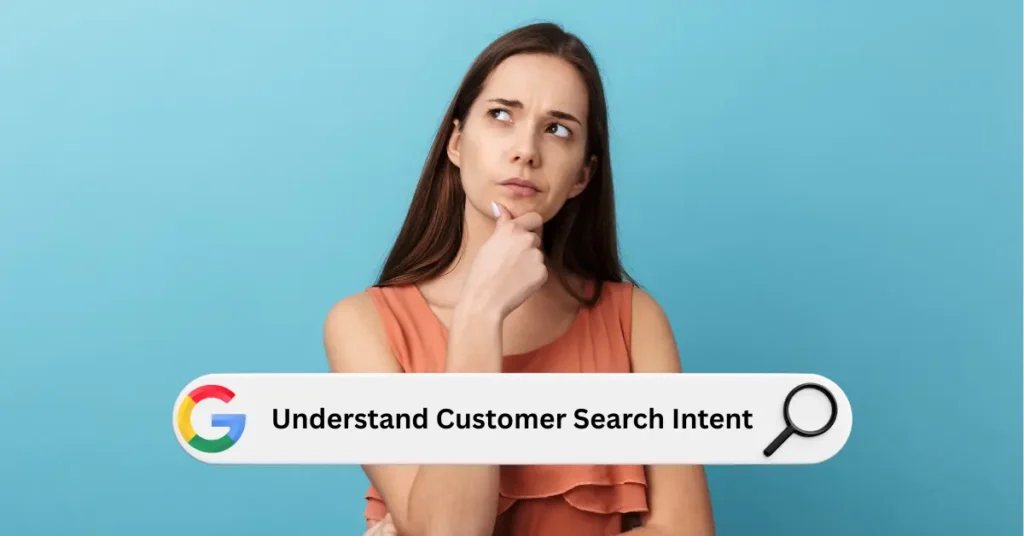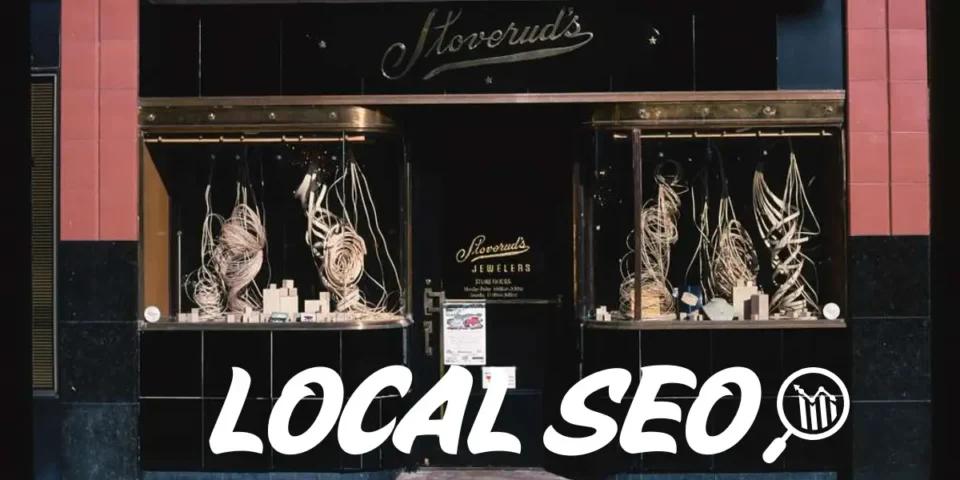- Get Your Free Digital Marketing Audit Today! 🚀 Let's Boost Your Online Presence Together! 💡
- +1 (647) 995-1577
- info@flexforce.pro
In today’s digital-first world, a stunning website isn’t enough—jewellers need to be found. With over 68% of online experiences starting on a search engine (BrightEdge), SEO is no longer optional; it’s the foundation of a brand’s visibility, credibility, and growth. As more jewellers shift to online platforms, a well-optimized site is essential not just for traffic—but for long-term sales and sustainable success.
According to digital commerce analyst Dr. Arjun Patel, “Jewelry brands that invest in SEO strategies are 3x more likely to achieve consistent year-over-year growth—especially in niche luxury markets.” This growth is driven by key tactics like keyword-rich metadata, mobile-first site design, optimized images, and structured data (schema markup). When executed correctly, even foundational elements—like title tags, internal linking, and site structure—can significantly improve your brand’s visibility and user experience.
👉 Explore our guide on the Latest Jewelry Advertising Ideas for 2025 to complement your SEO efforts with smart promotional strategies.
Entrepreneurs and established jewelers alike can implement many of the best SEO practices for jewelry websites free, including tools like Google Search Console, keyword research platforms, and on-page content refinement. These techniques enhance site indexing and improve audience targeting. This guide offers 20 actionable SEO tips tailored for jewelry eCommerce sites—each one designed to boost rankings, attract high-quality traffic, and build digital authority in 2025’s competitive landscape.
20 Successful SEO Tips for a Jewelry Store:

01. Build a Robust Website
Building an efficient website is the crucial first step for any jewelry store. Using tools like Google Trends can help you understand current customer interests, allowing you to tailor your content effectively. A well-designed, user-friendly website engages visitors, influences their buying decisions, and expands your audience reach. Establishing a strong digital foundation also enhances your brand presence and credibility among potential customers. Check here Best 10 Diamond Website Design
Every website should provide valuable information and serve a clear customer-focused purpose to build brand recognition. Optimizing your jewelry website with SEO best practices will help you achieve higher search engine rankings. Additionally, claiming your business listing on Google My Business can boost both visibility and local search rankings.
Below are the steps to create a robust digital foundation for your ecommerce store.
- Get a secure domain
- Optimize site architecture
- Simplify site navigation
- Search engine optimized content pages
- Create a review section
- Boost the website speed
02. Establish an SEO-compatible Site Structure
After building a solid website foundation, establishing an SEO-compatible site structure is crucial. Also known as information architecture, site structure refers to how your website’s content and pages are organized and linked together.
A clear and logical site structure helps visitors easily navigate your site, understand their location within it, and find products or information quickly. This improved user experience positively impacts your eCommerce SEO performance.
To create an effective site structure, start by defining a clear website hierarchy—organize your pages in a way that reflects how users browse and shop. Ensure consistent and well-organized header and footer sections, which assist search engines in efficiently crawling and indexing your site.
Additionally, implementing strategic internal linking between related pages further strengthens your site’s SEO and usability, helping improve your rankings on search results.
03. Understand Customer Search Intent

To optimize your eCommerce SEO strategy effectively, it’s essential to understand why customers visit your online store. This involves recognizing the three main types of search intent that guide user behavior:
-
Navigational Intent: Users with navigational intent are searching for a specific website or brand by name. They want to find your store quickly. Ensuring your brand’s name and homepage rank well helps capture this traffic.
-
Informational Intent: These users seek information about a product, service, or related topic. Creating informative and keyword-optimized content, such as blogs or product guides, helps attract and engage this audience.
-
Transactional Intent: Customers with transactional intent are ready to make a purchase or complete an action. Optimizing product pages, providing clear calls to action, and using follow-up emails or notifications can help convert these visitors into buyers.
By aligning your SEO and content strategies with these search intents, you can better meet customer needs, improve user experience, and increase your chances of converting visitors into loyal customers.
04. Assess Your Brand Reputation
Your brand’s reputation significantly impacts the success of your eCommerce SEO strategy. A positive reputation not only attracts the right customers but also builds trust, which can improve your search rankings.
Start by monitoring online reviews and customer feedback across platforms. Pay special attention to any negative experiences and respond promptly to address concerns. Proactively managing and improving your brand image can boost customer loyalty and market recognition.
Understanding your brand reputation helps you tailor your SEO and marketing strategies more effectively. Once you have a clear picture, you can implement targeted SEO efforts that support sustainable business growth. Follow This Guide to Upscale Your SEO Strategy.
05. Build a Positive Brand Reputation with Genuine Review Sites
After assessing your brand reputation, the next step is actively building it—starting with managing customer reviews. Many eCommerce businesses hesitate to engage with review sites, fearing negative feedback or no reviews at all. However, ignoring reviews can harm your brand’s credibility and SEO performance.
Trusted platforms like Sitejabber and Trustpilot offer tools to filter out fake reviews, helping you showcase authentic customer testimonials. Regularly monitoring and responding to reviews not only improves user experience but also signals to search engines that your site is trustworthy.
A strong presence on genuine review sites enhances your market reputation, drives more qualified traffic, and positively influences your search rankings across major search engines.
06. Get Genuine Product Reviews

Authentic product reviews provide invaluable insights for improving your offerings and customer service. Instead of avoiding negative feedback, eCommerce stores should actively address constructive criticism to build trust and improve their reputation.
Follow up with customers after purchase through surveys or feedback emails to gauge their satisfaction with both the product and website experience. For example, use a quick happiness survey after order confirmation and a follow-up email after delivery to collect detailed reviews.
Product reviews directly influence your brand’s credibility and play a crucial role in SEO. Positive reviews boost your search rankings and help attract more qualified buyers, ultimately driving better business performance.
07. Integrate SEO with Complementary Marketing Strategies
Combining SEO with other digital marketing tactics amplifies your reach and effectiveness. Partnering with reputable SEO service providers can also help you stay ahead of competitors.
Stay updated with search engine algorithm changes and maintain a flexible SEO strategy that allows ongoing improvements. Integrating SEO with paid advertising, email marketing, and targeted keyword campaigns creates a powerful synergy to boost your online visibility. I Increase Traffic 93.8k visitor [check case study]
By merging these strategies, you can enhance your brand image, increase search rankings, and convert more prospects into loyal customers. Curating complementary marketing efforts is essential for a successful eCommerce SEO strategy.
08. Curate a Suitable Keywords Strategy

A strong keyword strategy is the foundation of successful SEO jewelry efforts, especially in the highly competitive jewelry market. Choosing the right keywords can set your brand apart and help you outperform rivals.
Invest time in researching popular and relevant keywords that your target audience uses. Tools like ‘Keywords Everywhere‘ provide valuable data on search volume, cost-per-click, and competition, saving you time while refining your keyword list.
Focusing on industry-relevant and high-value search terms will boost your local rankings and attract more qualified traffic to your eCommerce site.
For a comprehensive list of jewelry keywords, check out our detailed Jewelry Keywords List blog post.
09. Optimize Your On-Page Content
Optimizing your website’s content is key to improving local search rankings and overall SEO performance. Focus first on creating valuable, user-friendly content that meets your visitors’ needs—this builds trust and engagement.
Aim to craft content that can appear in Google’s featured snippets, which are prominently displayed at the top of search results and attract high visibility. Study top-ranking industry websites for inspiration and to understand what works.
Consistently optimizing your on-page content will boost your brand’s credibility, improve search rankings, and enhance user experience, driving better business results over time.
10. Enhance Website Speed
Website speed is a critical factor for SEO and user experience. Slow-loading pages and frequent downtime frustrate visitors, leading to lower engagement and reduced conversion rates. Even the best SEO strategies will struggle to perform if your website is slow or unreliable.
A fast, stable website signals to customers that you value their time and investment. It also helps search engines rank your site higher, improving your visibility and traffic.
To improve your website speed, focus on these key areas:
-
Optimize your homepage for quick loading
-
Streamline category pages to reduce clutter
-
Fix broken links that cause delays
-
Use website-cleaning tools or bots to remove unnecessary files and improve performance
11. Invest in Mobile Experience
We live in a smartphone era, with two-thirds of internet users accessing the web via mobile devices. For ecommerce stores, investing in a mobile-first website is essential to capture this growing audience and improve conversion rates.
Mobile-optimized ecommerce sites consistently rank higher on search engines compared to those that aren’t mobile-friendly. During peak shopping periods such as sales and holidays, more customers prefer shopping from their phones, making mobile optimization a critical SEO factor.
When building a mobile-friendly ecommerce store, focus on:
-
Efficient site navigation and seamless user experience
-
Responsive design that adapts to various screen sizes
-
Fast page loading times and clear content presentation
-
Secure transaction pages with simple, intuitive checkout processes
12. Use Meta Tags and Descriptions
Meta tags and meta descriptions remain vital components of SEO. They help search engines understand your website’s content and influence how your listings appear on search results pages.
A meta description is the brief summary displayed beneath your page title in search results. Crafting unique, relevant, and user-focused meta descriptions encourages more users to click through to your ecommerce website.
While meta descriptions may not directly affect search rankings, they significantly impact click-through rates (CTR). Higher CTR leads to increased website traffic and greater opportunities for conversions. Therefore, investing time in writing quality meta tags and descriptions is essential for improving your ecommerce store’s online performance.
13. Publish and Promote the Brand
To enhance your brand’s visibility and authority, publish relevant content on high-authority websites and secure testimonials from reputable sources. Getting your brand featured on established platforms attracts the right audience and builds trust.
Publishing blogs and client testimonials on authoritative sites also generates valuable backlinks to your ecommerce store. These high-quality backlinks improve your domain authority, which is a key factor in search engine rankings.
Quality backlinks and citations contribute significantly to your SEO strategy by boosting your website’s ranking on search engine results pages (SERPs). Therefore, regularly promoting your brand through content published on reputable sites will strengthen your online presence and improve your market standing.
14. Employ 3D Product Representation
Jewelry product representation plays a critical role in engaging customers. Leading ecommerce sites now leverage advanced technologies like 3D modeling and Augmented Reality (AR) to showcase products more effectively. Embracing 3D product visualization is essential in today’s AI-driven retail landscape.
Offering a 360° interactive view provides customers with a unique and immersive shopping experience, allowing them to examine products from every angle. This transparency builds trust and positively influences purchasing decisions, ultimately boosting sales.
Integrating AR and AI not only enhances user experience but also increases site traffic and engagement metrics, which can improve your SEO performance. By providing an innovative shopping experience, your ecommerce store gains a competitive edge and attracts more engaged visitors.
15. Invest in Ad Marketing
Ad marketing, when integrated with SEO, can significantly boost your jewelry business’s local search rankings. Utilizing SEO promotion services helps optimize your paid campaigns for maximum visibility and return on investment.
Pay-per-click (PPC) advertising is one of the most effective tools in digital marketing. Combining SEO with PPC campaigns creates a powerful strategy that enhances both organic and paid search presence. This approach is especially beneficial for small and medium-sized ecommerce jewelers seeking to increase their digital footprint.
By integrating SEO and PPC, your website can climb the search engine results pages (SERPs) more quickly. Even after achieving strong organic rankings, PPC ads help maintain visibility by appearing prominently in the top paid positions. Since the top 2-3 spots on most search results are reserved for paid ads from high-impact sites, investing in ad marketing ensures your store gains essential exposure and drives more traffic.
16. Use Social Media Platforms to Enhance Market Visibility
Social media platforms provide powerful channels to promote your ecommerce jewelry store and target potential customers effectively. Establishing active social media profiles allows you to engage directly with your audience and expand your reach. Platforms like Instagram offer business tools that enable seamless shopping experiences, allowing users to browse and purchase products while interacting with your brand. Check here Instagram marketing strategy.
Collaborations with influencers and industry personalities on social media further boost brand recognition and credibility. This increased exposure helps drive more traffic to your website and strengthens your brand reputation.
Importantly, social media marketing complements SEO efforts by enhancing local search visibility and improving overall search engine rankings. By integrating social media strategies with SEO, jewelry businesses can achieve greater market presence and attract more qualified visitors.
17. Focus on Decreasing Your Bounce Rate
Bounce rate measures how many visitors leave your website after viewing only one page, reflecting how engaging your site is to users. A high bounce rate signals that visitors aren’t exploring further, which can negatively impact your search engine rankings.
To improve SEO and conversions, it’s essential to keep visitors engaged and encourage them to navigate through multiple pages. This can be achieved by creating compelling, relevant content and incorporating visual elements like images and videos that capture attention.
Since internet users typically have short attention spans, optimizing your site’s user experience—through clear navigation, fast loading times, and attractive design—can significantly reduce bounce rates and enhance your ecommerce store’s performance.
18. Focus on Customer Relationship Management
Effective customer relationship management (CRM) is critical for ecommerce success. How you handle customer feedback and inquiries directly influences your brand’s reputation and public perception.
Having a dedicated CRM team ensures timely responses to reviews, questions, and concerns, fostering trust and loyalty. Positive customer interactions boost your brand image, which in turn enhances local search rankings and organic traffic.
A strong CRM strategy not only supports customer satisfaction but also contributes to better SEO performance by attracting and retaining engaged visitors. Investing in efficient CRM processes is essential for sustainable growth and market success.
19. Filter Duplicate Content
Duplicate and fake product listings can severely damage user experience and your ecommerce brand’s reputation. Search engines penalize sites with identical or copied content, resulting in lower rankings and reduced organic traffic.
Duplicate listings often lead to negative customer reviews, further harming your brand image. It’s crucial to verify vendors’ credibility and product authenticity to maintain a trustworthy store.
Leveraging AI and machine learning tools can efficiently detect and remove duplicate or counterfeit listings, ensuring your site remains SEO-friendly. This proactive approach improves your local rankings, enhances marketing visibility, and drives sustainable growth.
20. Secure Your Store and Protect Customer Data
Ecommerce stores handle sensitive customer data, making them prime targets for hackers and malicious attacks. Protecting this data is not only a legal obligation under privacy agreements but also essential to maintaining customer trust and avoiding costly legal issues.
To safeguard customer information, many ecommerce businesses are partnering with AI-driven security firms. These companies utilize artificial intelligence and deep learning algorithms to detect suspicious activity and prevent unauthorized access in real time.
Implementing robust AI and machine learning security solutions helps keep scammers and cybercriminals at bay, enhancing your store’s credibility. A secure website fosters a positive brand image, which in turn boosts SEO performance by improving search engine rankings and customer confidence.
Case Study: Proven SEO Success Stories
For those looking to see real-world examples of SEO success, FlexForce’s SEO portfolio showcases a variety of projects across industries, including eCommerce and product-based businesses. While there may not be a jewelry-specific case study currently featured, their proven strategies and results highlight effective SEO practices that can be adapted to boost your jewelry store’s online visibility and traffic. Exploring their portfolio can provide valuable insights and inspiration for implementing SEO tactics that drive measurable growth.
Conclusion:
Driving organic traffic to any website is a challenging endeavor, and the jewelry market’s fierce competition makes it even tougher. However, with the right SEO strategies, attracting and converting quality traffic is absolutely achievable.
SEO is a powerful tool that drives sustainable, long-term growth for your ecommerce store. The key is to start early and implement smart, consistent tactics.
Keep in mind that SEO is a gradual process — it typically takes 20 to 25 weeks before noticeable results begin to show. But once your rankings improve, your growth trajectory can accelerate rapidly. To maximize success, balance your SEO efforts with targeted PPC campaigns, combining the best of both worlds to stay competitive and profitable in the evolving digital landscape. Ready to grow your jewelry business with expert SEO and web design support?👉 Get a Quote Today and start your journey to stronger visibility and more conversions.
FAQs
What are the best SEO keywords for jewelry?
Use buyer-intent keywords like “custom engagement rings,” “gold jewelry online,” and “handmade necklaces.” Research using tools like Ahrefs or SEMrush to align keywords with your product offerings.
How to attract customers for jewellery?
Optimize product pages with high-quality visuals, compelling descriptions, and structured metadata. Ensure fast loading, mobile responsiveness, and keyword-rich content to improve search visibility and attract high-converting traffic.
What are good SEO practices?
For jewelry websites, good SEO includes keyword-optimized titles, image alt tags, secure HTTPS, mobile-friendly design, fast speed, internal linking, and schema markup to enhance product discovery on Google.
What are the 4 pillars of SEO?
The four pillars are Technical SEO, On-Page SEO, Off-Page SEO, and Content. Jewelry websites must focus on all four for better rankings, traffic, and sustainable online visibility.
Author BIO:
Naomi Wilson is the Strategic Director and Content Marketing Strategist at Haitna.com, She specializes in helping businesses boost their online presence through effective SEO and content strategies. Naomi has successfully guided numerous technology startups to achieve higher organic rankings and attract more customers.





2 Comments
[…] article outlines some useful SEO tips for jewelry businesses to improve their online visibility and attract more potential customers through search engines. It […]
[…] Essential SEO Tips for Jewelry Businesses […]